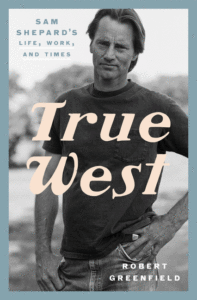Our feast of fabulous reviews this week includes Ethan Hawke 0n Robert Greenfield’s True West: Sam Shepard’s Life, Work, and Times, Casey Cep on Charles Portis’s Collected Works, Emily Raboteau on Susan Crawford’s Charleston: Race, Water, and the Coming Storm, Frances Wilson on The Diaries of Franz Kafka, and Kristen Millares Young on Katie Holton’s The Language of Trees.
“I first met Sam Shepard in Chicago at a rehearsal for Steppenwolf’s production of his play Buried Child in 1995. At the morning coffee break, over bagels and orange juice, he asked if I liked Maker’s Mark. When I said I did, he suggested we blow off the rest of rehearsal and get drunk. He was serious. A few years later he played my father in a film of Hamlet. In rehearsal he spoke commandingly about Shakespeare’s percussive qualities—then lost his temper, ripping into a camera assistant who had botched the focus on his best take. Moments later he called the company together to publicly apologize to the man, blaming his outburst on his own mediocrity as an actor … I lead with all this to state the obvious: Sam Shepard was a complicated man. Capturing his persona and making a clear narrative out of his mercurial life are not easy tasks. Shepard’s writing is intimate and passionate and feels full of secrets—truths whispered to like-minded souls. Those of us who have read most of his work, much of it seeming like thinly fictionalized memoir, feel like we know his inner story: his sense of alienation, his search for an authentic definition of masculinity and his drive for balance in the masculine/feminine dynamic. In his plays, Shepard’s song of the self is clearly scored … It’s a curious experience to read a biography of someone you knew written by someone who did not know them. I opened this book eager to find out how a more objective observer would view and summarize such an elusive man’s life. I recognized the figure presented in the pages of True West and learned a great deal about what happened in his life before and after I met him. But the man remains essentially inscrutable, as if we are cross-examining him from the distance of a drone—we learn where and when he went, but we have no idea why. And that is probably the way Sam Shepard would have liked it.”
–Ethan Hawke on Robert Greenfield’s True West: Sam Shepard’s Life, Work, and Times (The Washington Post)












